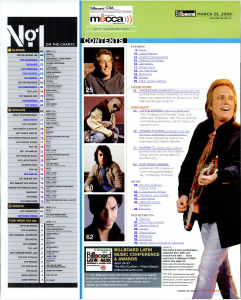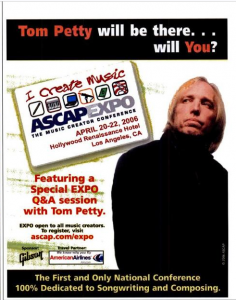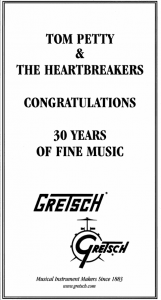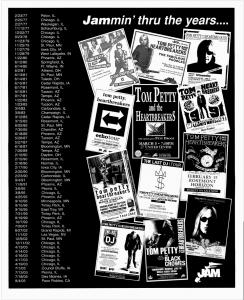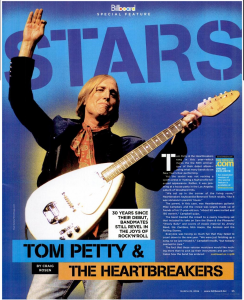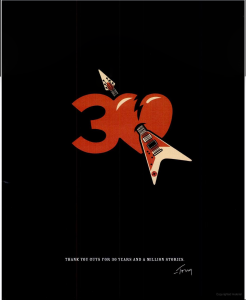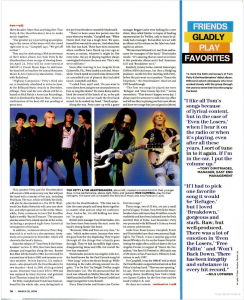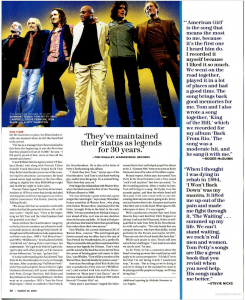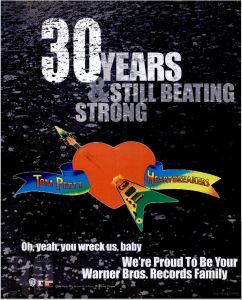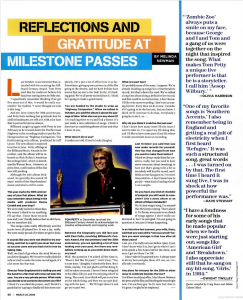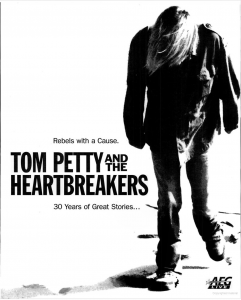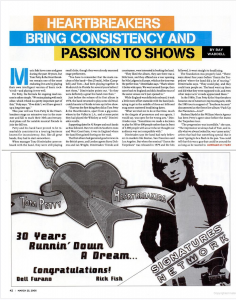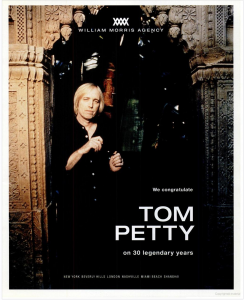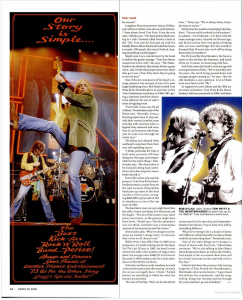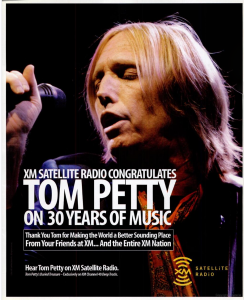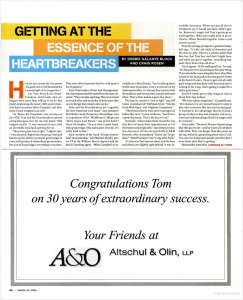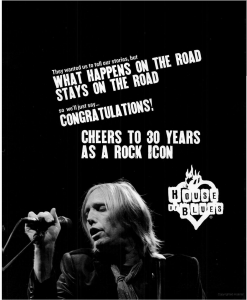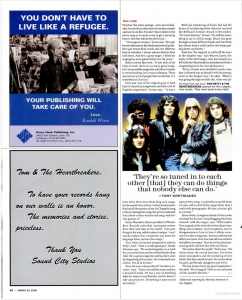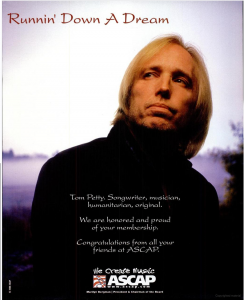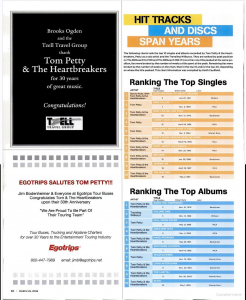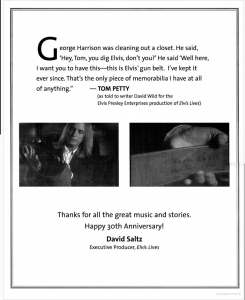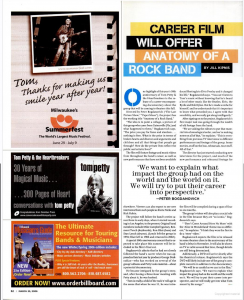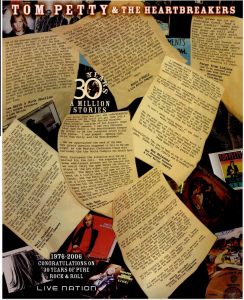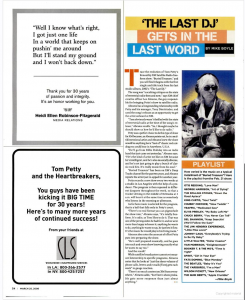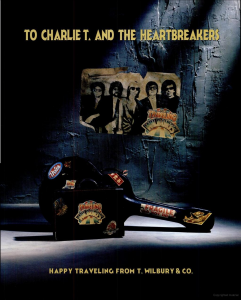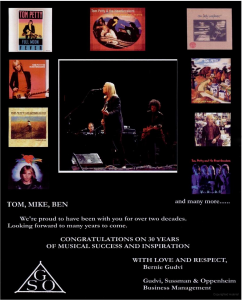Billboard Special Feature: STARS: Tom Petty & The Heartbreakers
By Craig Rosen
Billboard - March 27, 2006
30 years since their debut, bandmates still revel in the joys of rock'n'roll.
Tom Petty & the Heartbreakers rang in this year -- which marks the 30th anniversary of their debut album -- doing what many bands do on New Year's Eve: performing.
Yet the sextet was not rocking a sports arena or making a high-profile televised appearance. Rather, it was jamming at a house party in the Los Angeles suburb of Woodland Hills.
"We set up in the corner of the living room," Heartbreakers keyboardist Benmont Tench recalls, "like it was someones' parents' house."
The parent, in this case, was Heartbreakers guitarist Mike Campbell, and the crowd was largely made up of friends of his 17-year-old son. "About 50 were invited and 150 weren't," Campbell quips.
The band treated the crowd to a nearly hourlong set that included its take on Sam the Sham & The Pharaohs' "Wooly Bully" and covered of classic material by Jimmy Reed, the Zombies, Slim Harpo, the Animals and the Rolling Stones.
Everyone was having so much fun that they failed to count down to the new year. "We were just finishing a song, so we just missed it," Campbell recalls, "but nobody seemed to care."
The fact that these veteran musicians would like nothing more than to pick up their instruments and jam illustrates how the band has endured three decades. More than anything else, Tom Petty & the Heartbreakers love to make music together.
"Our greatest joy is just setting up and playing in the corner of the house with the crowd right next to us," Campbell says. "We get off on that."
They may be celebrating a 30th anniversary of their debut album, but Tom Petty & the Heartbreakers show no sign of slowing down. On April 22, Petty will be interviewed at ASCAP's 1 Create Music Expo. In mid-June, the band will co-headline the annual Bonnaroo Music & Arts Festival in Manchester, Tenn., with Radiohead.
"Highway Companion," Petty's third solo set, is tentatively scheduled to arrive in June. At the Billboard Music Awards in December, offstage, Petty said the new album will be released on Rick Rubin's American Recordings, which is distributed by Warner Bros. However, confirmation of the deal still was pending at press time.
This summer Petty and the Heartbreakers will mount a 30th-anniversary tour that will pair the band with a number of hot acts, including Pearl Jam. The tour, which will likely hit sheds, will also be documented on a live DVD. Westwood One Radio Networks will carry one show live, and other specials are in the works. Meanwhile, Petty continues to host XM Satellite Radio's weekly "Buried Treasure." The satcaster also has some Petty-related specials in the works, including a proposed eight-hour historical retrospective of the band.
In addition, acclaimed director Peter Bogdanovich is at work on a documentary, tentatively set to premiere in November, which will chronicle the band's history.
Since the release of "Tom Petty & the Heartbreakers" on Nov. 9, 1976, there have been some changes and tragedies along the way. Bassist Ron Blair left the band in 1982, but returned for a second tour of duty in 2002 and remains and current member. Howie Epstein, his replacement -- who played with the Heartbreakers for two decades -- died in 2003 of drug-related causes.
Drummer Stan Lynch left in 1994 and was replaced by Steve Ferrone, and guitarist Scott Thurston joined the fold in 1991.
Yet Petty, Campbell and Tench have been onboard for the whole ride, even dating back to the pre-Heartbreakers ensemble Mudcrutch.
"There've been some low points over the years when you wonder," Campbell says. "When Howie died, that was a tough time. We questioned if we wanted to carry on. And when Stan left, that was hard. There have been moments when conflicts have flared up over ego or women or money, whatever it might be. But every time, the joy of playing together always outweighed whatever the issue was. That's why we're still here."
Soon after moving to Los Angeles from Gainesville, Fla., Petty landed a solo deal. Meanwhile, Tench opted to record some demos with an assembled cast of players that included Lynch, Campbell and Blair.
"I called Tom and I said, 'Do you want to come down here and give me some pointers on how to sing this demo?' He came down and he liked the sound of the bunch of us, so he quit his solo record, and we made the first band record. So he snaked my band," Tench quips.
Along the way, Petty came up with a game plan for the Heartbreakers. "The idea was to take the same people and keep the together no matter what and see what we could produce. And so far, it's still holding our interest," he quips.
British-born manager Tony Dimitriades, who has been there from nearly the start, notes the band's strong family-like bond.
"Benmont, Mike and Tom are very close," he says, "which makes sense, because they were the guys from the very beginning. They've gone through all the things that a family goes through. They've had incredibly high times, disappointing times and tiffs, but overall the love has remained."
Dimitriades moved to Los Angeles with Ace, the band known for the Paul Carrack-sung hit "How Long," only to see the act break up. While listening to the radio driving around Los Angeles, "I'm On Fire" by Dwight Twilley caught Dimitriades' ear. The DJ announced that the track was released on Shelter Records, the new label launched by fellow Brit Denny Cordell and singer/songwriter Leon Russell.
Since Dimitriades and former Joe Cocker manager Reggie Locke were looking for a new client, they called Shelter in hopes of landing representation for Twilley, only to learn he already had a manager. But another new act with an album set for release on the label was looking for an adviser.
"We went and listened to it, met Tom and became the managers of the band," Dimitriades recalls. "It's amazing that we went in to listen to this particular album and it had 'American Girl' and 'Breakdown' on it."
Similarly, Jimmy Iovine, current Interscope/Geffen/A&M chairman, but then a fledgling producer, recalls his first meeting with Petty, before the pair went on to produce "Damn the Torpedoes," the Heartbreakers' third set and 1979 breakthrough.
"The first two songs he played me were 'Refugee' and 'Here Comes My Girl,'" Iovine remembers. "That doesn't happen every day. I always wait foe someone to walk into my office and tell me they're playing me their new album and have two songs that [are as] good as [those] first two songs."
Those songs, two of 25 hits, are just a small part of a legacy. To date, Tom Petty and the Heartbreakers have sold more than 50 million records worldwide and have been inducted into the Rock and Roll Hall of Fame. Last December, Petty was presented with Billboard's Century Award for artistic achievement.
Aside from these honors, Campbell, Tench and Dimitriades have their own personal highlights. For Tench, it was a surprise gig at the famed Whisky a Go Go on the Sunset Strip following the night after a sold-out date at the Los Angeles Forum, in support of "Damn the Torpedoes," the first US Festival in 1982 and a run of 20 shows at San Francisco's Fillmore Auditorium in early 1997.
For Campbell, it was the 1986-87 trek in which the Heartbreakers supported and served as Bob Dylan's backup band. "That was eye-opening," he says. There were also the Gainesville homecoming shows, headlining New York's Madison Square Garden for the first time and the band's initial U.K. visit.
He does not remember the exact time or place, but Dimitriades recalls one moment when he felt the band had truly arrived.
"For me as a manager that's been involved in this from the beginning, it was the first time that they played in front of 15,000," he says. "I felt pretty proud of that, more so than all the awards and charts."
It was William Morris Agency senior VP Barbara Skydel, who along with Premier Talent founder Frank Barsalona helped build Tom Petty & the Heartbreakers into one of the country's top live attractions. Last summer, the band scored career-high numbers at the box office, taking in slightly less than $600,000 per night and 16,500 per night in ticket sales.
Premier Talent signed Tom Petty & the Heartbreakers in 1978 to a roster that already included Led Zeppelin and Bruce Springsteen as as well as relative newcomers Van Halen, Journey and Talking Heads.
"We always felt that we wanted to work with artists that have the potential to have a 20- or 30-year career," Skydel says. "Even at the beginning we felt Tom and the Heartbreakers had the potential to do that."
Some attribute the Heartbreakers' longevity to the fact that its members are allowed to work on outside projects, including Petty himself. Although several Heartbreakers make appearances on Petty's solo discs, 1989's "Full Moon Fever" and 1994's "Wildflowers," Tench admits he feels "a little left out" during Petty's solo forays, but understands. "He's got to do what he's got to do. I get to play with other people, so if he wants to do one without me," he says, "go have fun."
It is that understanding that has allowed Tom Petty & the Heartbreakers to carry on through the years. After co-producing "Full Moon Fever" with Petty and Campbell, former Electric Light Orchestra frontman Jeff Lynne collaborated with Petty, George Harrison, Bob Dylan and Roy Orbison in the Traveling Wilburys. He then went on to co-produce 1991's "Into the Great Wide Open," which is credited to Tom Petty & the Heartbreakers. He is also at the helm of Petty's forthcoming solo album.
"I think they love Tom," Lynne says of the Heartbreakers, "and Tom's a real hard-working guy, and he loves his group. It's a mutual thing. That's how they carry on."
Petty began his relationship with Warner Bros. when the label issued the first of two Traveling Wilbury albums in 1988.
"He was obviously a great artist and a great songwriter and singer," says Lenny Waronker, former president of Warner Bros., who along with former Warner Bros. chairman/CEO Mo Ostin, brought Petty to the label in the early 1990s. "He was somebody we felt had a long career ahead of him, so it was an easy decision when he became available. It's hard to find people who have that kind of talent that special thing that makes them their own person."
Tom Whalley, the current chairman/CEO of Warner Bros., concurs: "The word legend gets thrown around way too often, but in the case of Tom Petty & the Heartbreakers, it's a perfect fit. They've earned the title and have maintained their status as true legends for 30 years. Tom's voice and the sounds of the band has never steered from the course of bringing great rock music to their fans," says Whalley. "Tom will be a member of the Warner Bros. Records family for years to come."
American Recordings chief Rick Rubin has also co-produced a Petty solo set ("Wildflowers") and worked with him and the Heartbreakers on "Mary Jane's Last Dance," one of two new tracks recorded to flesh out 1993's MCA Records "Greatest Hits" set.
"Mary Jane's Last Dance" topped the Mainstream Rock chart and helped propel the album to No. 5. "Greatest Hits" went on to score an RIAA Diamond Award for sales of 10 million copies.
Mutual respect, Rubin says, has turned Tom Petty & the Heartbreakers into a fine-tuned "rock 'n' roll machine" that few can match. "In the recording process, when it works its best, Tom will bring in a song. He'll play it on the acoustic guitar, and then the whole band will then playing it the next round with no one discussing what anyone else is going to do. Everyone just knows what to do. Everyone just knows what their role is in the band. What space to fill, what space to leave. It's very organic."
With a production resume that runs from Beastie Boys and Red Hot Chili Peppers to Johnny Cash and Neil Diamond, Rubin is well-qualified to rank Tom Petty & the Heartbreakers with rock royalty. "The only bands that you compare them to, who have that ability, would probably be the Stones and maybe AC/DC. There are not a lot of rock bands that have that."
While such praise is nice, Tench still sees some future challenges. "I just want to see what we can do next," he says.
As for Petty, he has a comment about the band's touring prowess that could just as well apply to its career perspective. "I think I ever feel that I'm not doing it well, I would just stop," he says. "But as long as we're doing it and we're doing it at the standard we want to be playing and the people are happy, we'll keep doing that."
Friends Gladly Play Favorites
Billboard -- March 25, 2006
To mark the 30th anniversary of Tom Petty & the Heartbreakers' debut album, Billboard asked colleagues who have worked closely with the group through the years to name their favorite song by the band.
"I like all Tom's songs because of lyrical content, but in the case of 'Even the Losers,' when I hear it on the radio or even it's playing, even after all these years, I sort of tune in to it again. If I'm in the car, I put the volume up."
-- Tony Dimitriades, Manager, East End Management
"If I had to pick one favorite song it would be 'Refugee,' but I loved 'Breakdown,' gorgeous and stark. Raw, but well-produced. There was a lot of emotion in 'Even the Losers,' 'Free Fallin'' and 'Won't Back Down.' There has been integrity and substance in every hit record."
-- Nils Lofgren
"'American Girl' is the song that means the most to me, because it's the first one I heard him do. I recorded it myself because I liked it so much. We went on the road together, played it in a lot of places and had a good time. The song brings back good memories for me. Tom and I also wrote a song together, 'King of the Hill,' which we recorded for my album 'Back From Rio.' The song was a moderate hit, and he sang it with me."
-- Roger McGuinn
"When I thought I was dying in rehab in 1994, 'I Won't Back Down' was my mantra. It lifted me up out of the pain and made me fight through it. 'The Waiting' ... summed up my life. We can't stand waiting, we rock'n'roll men and women. Tom Petty's songs are like a great book you revisit when you need help. His songs make me better."
-- Stevie Nicks
"'Zombie Zoo' always puts a smile on my face, because George and I and Tom and a gang of us were together on the night that inspired the song. What makes Tom Petty a unique live performer is that he is a storyteller. I call him 'Aesop Wilbury.'"
-- Olivia Harrison
"One of my favorite songs is 'Southern Accents.' I also remember being in England and getting a real jolt of electricity when I first heard 'Refugee.' It was such a structured song, great words ... I was turned on by that. The first time I heard it sung live, I was in shock at how powerful the performance was."
-- Dave Stewart
"I have a fondness for some of his early songs that he made popular when we both were just starting out; songs like 'American Girl' and 'Breakdown.' I also appreciate still that he sang on my hit song, 'Girls,' in 1984."
-- Dwight Twilley
Reflections and Gratitude at Milestone Passes
By Melinda Newman
Billboard -- March 25, 2006
Last October, in an interview that coincided with his receiving the Billboard Century Award, Tom Petty said he would not believe his hand was starting down its 30th year. "I specifically remember thinking if we get five years out of this, it would be really successful," he recalled. "I never thought we'd do it this long."
And yet, here comes the 30th anniversary, and Petty feels nothing but gratitude that he and his bandmates are still at it, with a fan base that is just as fervent as always.
Billboard caught up again with Petty in late February as he cruised down the Pacific Coast Highway to the recording studio to put the finishing touches on "Highway Companion," his forthcoming solo album, produced by Jeff Lynne. The new album is expected to arrive in June. Petty, offstage at the Billboard Music Awards in December, said the album will be released on Rick Rubin's American Recordings label, which is distributed by Warner Bros. However, at press time, confirmation of the deal was still pending.
Although the solo album beckoned, he genially discussed 30 years' worth of the Heartbreakers' music and what is still to come.
This year marks the 30th anniversary of your first album. What do you remember about being in the studio with producer Denny Cordell and your boys?
We were really excited in those days. We weren't afraid to try anything, I'll say that. I hear those records now and I can't hardly believe that we did them, but we somehow did.
The songs came really effortlessly and the tracks were all played live. It was a joy, really. We were really proud of it when we got it done.
It sounds like you were not afraid to try anything, and that is a spirit you never lost even as success came and you had a lot to lose by taking risks.
Well, we kind of go where the wind blows us, you know [laughs]. We've never really played it safe or tried to make the same record again, it's a lot more fun that way.
Director Peter Bogdanovich is trailing you and the band for a film that will come out later this year. You are a very private person. What made you decide to let someone document your life?
I think it's a worthwhile project, and I think it's good that he's going to finally tell this story completely. He's put a lot of effort into it so far. Sometimes, giving up your privacy is a little like going to the dentist, and we have let him have access that no one's ever ha. So far, it's looking good. We're all pretty excited about it. I think he's going to make a good movie.
You are headed to the studio to wrap up "Highway Companion." When we talked in October, you said that the album is about the passage of time. What else can you say about it?
I'm reaching there to try and find a theme. It's just really a nice collection of songs. I think it does have an underlying theme of time and what it does to you.
What does it do to you?
It makes you old, if you're lucky [laughs].
Between the biography you did last year with Paul Zollo, receiving Billboard's Century Award, the documentary and the 30th anniversary, you are spending a lot of time looking over your past. Are there any revelations coming up as you stroll down memory lane?
Well, the question I'm asked all the time is, "Does it feel like 30 years?," and I'd say, "Yes, it sure does." [laughs] It absolutely does. But I think, mainly, I'm just glad to still be doing it, still be taken seriously. I haven't been relegated to the oldies file yet, and I'm enjoying what I'm doing. The movie I just think will out a nice bow on the whole thing, and then we can quit dealing with the past ... We'll forget about it and get on to part two.
What is in part two?
It's probably more of the same, I suppose. We're already building up songs for a Heartbreakers record, but that's down the road. We've talked a long time about doing a definitive live record, and that could be on the horizon. I don't know. I'd like to do more recording. I don't see us touring forever. Every time we do it now, I wonder if it's going to be the last one, but you know, I think we'll continue to do that, everybody's gung-ho to do it, so ...
Why do you think it could be the last one?
I don't know how many more 50-city tours I want to take on. I've spent my life doing that, and I'd like to have some part of my life where I could concentrate more on recording.
Last October you said that you now make records for yourself. How has that changed from how you used to make them before?
I think we always made them for ourselves, really, but you used to have more concerns about [wanting] to have one that's going to be a hit so everybody will buy the record, and I think as time has gone on, I'm more interested in -- I don't know how to put [it] -- what kind of catalog of stuff I can compile.
Do you have any kind of checklist of projects of projects you still want to complete? Like a duet album or an album of blues standards?
No, it's just song to song. I'm amazed that they keep coming. That's about it. It's funny, every year or so a batch of songs appear. I don't really understand it, but I'm just glad. I'm not going to question it, because it keeps happening.
In an interview last summer, your wife, Dana, said that you were still a "nervous wreck" before you went onstage. Is that true after all these years?
I am, yes. I'm really nervous before I play. I just, I don't know what it is, but I get to where I can't even speak for a few hours before the show, and once I get out there I'm OK.
I don't take it for granted ever. I always want to do my best and give them all I can, so, I really take it seriously.
Any plans for reissues for the 30th of other ways to celebrate besides the tour?
You'd have to ask [my] office, I don't know. Between the press and th film and finishing the record right now, I'm one busy guy. So it's nuts, but I love it, it's great. I'm glad to be employed.
Heartbreakers Bring Consistency And Passion To Shows
By Ray Waddell
Billboard -- March 25, 2006
Music fads have come and gone during the past 30 years, but Tom Petty & the Heartbreakers remain one of the most enduring live acts by playing their own intelligent version of basic rock 'n' roll -- and playing it very well.
For Petty, the formula for ongoing road success is rather simple. "We enjoy playing with each other, which I think is a pretty important part of this," Petty says. "If we didn't, we'd have given it up a long time ago."
This year will see Tom Petty & the Heartbreakers stage an extensive tour in the summer and fall to mark their 30th anniversary. And plans call for notable music friends to join the bill too.
Petty and his band have proved to be remarkably consistent in a touring business known for inconsistency. But, like all great bands, they had to start somewhere.
When manager Tony Dimitriades came onboard with the band, they were still playing small clubs, though they were already seasoned stage performers.
"You have to remember that the main nucleus of the band -- Ben [Tench], Mike [Campbell] and Tom -- had been playing together in Mudcrutch in Florida for several years before I met them," Dimitriades points out. "So they were definitely a great live band even then."
Just before the release of its first album in 1976, the band returned to play some old Mudcrutch haunts in Florida to tune up its live show.
"That was the first thing they did as Tom Petty & the Heartbreakers, apart from a gig somewhere in the Valley in L.A., and at some point they had played the Whiskey as well," Dimitriades recalls.
Supporting dates for Al Kooper and such bands as Kiss followed. But even with its Southern roots and West Coast base, it was in Enngland where the band first gained footing on the road.
The first album had garnered good reviews in the British press, and London agents Barry Dickens and Ian Wright, Dimitriades' friends and countrymen, were interested in booking the band.
"They liked the album, they sat there was a little buzz, and they offered me a tour opening for Nils Lofgren in Europe, which at the time was the perfect tour," Dimitriades says. "That's where it broke right open. We went around Europe, then came back to England and did a headline tour of the same venues we'd just opened in."
While England was definitely onboard, it took a little more effort stateside with the band jockeying to get in the middle of three-act bills and snag some scattered headlining dates.
"What we tried not to do at that time, much to the chagrin of promoters and our agents, I would say, was open for the wrong acts," Dimitriades says. "Sometimes we made a decision to play for 500 or 600 people rather than in front of 5,000 people with an act who we thought our audience was not compatible with."
Dimitriades says the band had early believers in markets like Boston, San Francisco and Los Angeles. But when the seminal "Damn the Torpedoes" was released in 1979 and the hits followed, it went straight to headlining.
The foundation was properly laid. "There were about four years before 'Damn the Torpedoes' where the band did a lot of touring," Dimitriades says, "They could play, and they could turn people on. The band went up there and did what they were supposed to do, and even other major acts' crowds appreciated them."
In the 1980s, Tom Petty & the Heartbreakers became one of America's top touring acts, with the 1985 tour in support of "Southern Accents" documented as the fierce live album "Pack Up The Plantation -- Live!"
Barbara Skydel at the William Morris Agency has been Petty's agent since before the Damn the Torpedoes tour.
"The progression was incredible," she says. "The impression we always had of Tom, and really what we always looked for, was 'career artist,' artists that had that special something that it wasn't going to be a flash in the pan. You could tell that this was a guy that could be around for as long as he wanted to be around."
Longtime Phoenix promoter Danny Zelisko, now with Live Nation, was also an early believer. "I have always loved Tom Petty. From the very start," Zelisko says. "The band and he liked coming to a club I booked called Dooley's back in the '70s. Tom and the boys got up with the Muddy Waters Blues Band and rocked the house to maybe 100 people that stayed behind, hoping something would happen."
Skydel sees it as a commitment by the band to deliver the goods onstage. "Tom has always stayed true to his craft," she says. "The Heartbreakers are fabulous, they always deliver a great show, and I think that people know that when they go to see a Tom Petty show they're going to see the best."
One of the key testaments of the band's onstage prowess was not part of one of its own huge headlining tours. Bob Dylan invited Tom Petty & the Heartbreakers to join him on his True Confessions world tour in 1986-1987, giving a superstar band the chance to be sidemen for one of rock's most intriguing tours.
"First of all, it was a joy for all of them," Dimitriades says of the Dylan tour. "Secondly, it was a learning experience to step outside their normal comfort zone and play with someone who's a legend they admired and were fans of, and someone who keeps you on your toes through an entire tour."
The Dylan tour allowed Petty and band to step back from their own still-exploding career.
"I think, particular for Tom, it took some pressure off from being the front guy and responsible for the entire thing," Dimitriades says. "My observation is he enjoyed sitting back sometimes and observing how somebody else did it."
Even with various solo and side projects, Tom Petty & the Heartbreakers remain a major force on the road. Last year, Petty and his band put up some of the best numbers of their career, averaging $600,000 in gross and 15,763 in attendance as one of the top tours of 2005.
The band drew more on a per-night basis than box-office titans including Neil Diamond and the Eagles. "The fact of the matter is our ticket prices were lower, so the grosses might have been lower," Skydel says. "But the attendance was incredible, and there was a tremendous amount of excitement around the shows."
Dimitriades adds, "What we charge is not because we couldn't charge more, it's because that's what we all choose to do."
While Petty's box-office feats in 2005 were impressive, it is really nothing new for the band. For The Last DJ tour in 2002, the band's most recent trek with a like number of large-venue dates, the averages were $468,767 at the box office and 15,490 tickets sold, for a total attendance of 681,592 for 44 shows.
Petty does not focus on the numbers as much as the performances and call touring "as much fun as you can legally have, I think." Packed houses are something to which the artist has become accustomed.
"We sort of feel like, 'Well, we do this all the time,'" Petty says. "We're always there, if people want to notice."
Petty leaves the number crunching to his handlers. "I'm not really involved in the business," he admits. "I'm fortunate -- I've been with the same manager since I started out 30 years ago and he has always been very good at looking after our tours and things. But who would've dreamed that 30 years later we'd still be doing these kind of numbers?"
For Petty and the Heartbreakers, the focus is more on the art than the business, and much of his art, it seems, is connection with fans.
And Petty notes the band is connecting with a new generation of fans. "We've seen this over the years, the torch being passed down and younger people coming in," he says. "But we still maintain a core audience. A lot of them were even there in the '70s."
In support of a new album and the 30th anniversary milestone, Tom Petty & the Heartbreakers will tour extensively in 2006, with dates concentrated in the June-July and September-October time frames. True to form, they will try something different.
"What we're trying to do is a bunch of shows with different artists that either we like or think would be an interesting show," Dimitriades says.
"One of the main things we're doing is a bunch of shows with Pearl Jam," Dimitriades continues. "We're also talking to John Mayer about doing some dates, as well as the Strokes. And maybe in the occasional show there will be a friend [to] come on the road with us for a few days."
Asked to boil down the essence of the touring longevity of Tom Petty & the Heartbreakers, Dimitriades cites two key factors: "A great band that delivers live consistently. And the songwriting. Songs that resonate and last through the years and don't go out of fashion."
Getting At The Essence Of The Heartbreakers
By Debbie Galante Block and Craig Rosen
Billboard -- March 25, 2006
How do you convey the live power of a great rock 'n' roll band and the essential gift of its songwriter?
For Tom Petty and the Heartbreakers, old friends and colleagues were more than willing to try for this report celebrating the band's 30th anniversary. And band members Mike Campbell and Benmont Tench weighed in as well.
"As 'Damn the Torpedoes' was coming out [in 1979], Tom and the Heartbreakers opened a long European tour for my solo band," Nils Lofgren recalls. "It was unusual to have such an incredible rock band open for us.
"They were great every night," Lofgren says. "I was shocked. Right from the get-go, the band had an innate ability to present great songs in a very well-produced streamlined presentation. Not a lot of frayed edges, everything in place. They were able to present that live with quite a bit of passion."
Tony Dimitriades of East End Management, who has represented the band from the start, declares: "They can play anything. They're so tuned in to each other and so similar in their tastes they can do things that nobody else can do."
Petty and the Heartbreakers are "arguably the best American rock band," says producer Rick Rubin, head of American Recordings, who is co-producer of the "Wildflowers" album and "Mary Jane's Last Dance," one of the band's many hit singles. "So you have a great band, with great songs, who make great records. It's really hard to beat."
Each member of the band "brings tremendous musicianship," says Barbara Skydel, senior VP at the William Morris Agency and the band's booking agent. "Mike Campbell is incredible as is Ben [Tench]. You're talking about world-class musicians. Tom's no slouch on his instrument either. It's the way they connect with each other. That's what makes a great live show."
The band in concert is "just so tight," says Jeff Lynne, co-producer of "Full Moon Fever," "Into the Great Wide Open" and "Highway Companion."
"They kind of know what they're going to do before they do it," Lynne continues. "And Tom's a great frontman. That's the key to it all."
Sonically, "what makes them sound the way they do is as much their imperfections as it is their talent and originality," says Jimmy Iovine, the chairman of Interscope/Geffen/A&M Records, who co-produced "Damn the Torpedoes," "Hard Promises" and "Long After Dark."
"It's the way Tom lays on a beat, and the bass and drums are slightly right behind. It was incredible chemistry. When you put all the instruments up, it would just lock. Mike's guitar, Benmont's organ, and Tom's guitar go so well together. What you really have is an orchestra. When blended together it has a real concert sound."
From his onstage perspective, guitarist Campbell says, "It's the old cliche of chemistry and the way we play. There's a certain talent that Ben has, that Tom has, and that I might have, and when you put it together, something happens what's better than all of us."
Tench agrees. "If it's really good live," he says, "it's because we're all aiming at the same thing. There should be some telepathy there. Ron Blair is back in the band and as the new guy he's been in the band 10 years. If you've got a lot of really good songs and play them with heart and you're aiming at the song, that's going to make for a really good show."
And few bands get to play songs as rich as those Petty has written.
"We have a great songwriter," Campbell says. "His character is very powerful and it's easy to play with someone like that and sound good. It worked to his advantage that he found a group of players that had empathy and an instinctual understanding of how his songs could be realized."
Tench adds: "There are 30 years of great songs that this guy wrote -- and he wrote a lot of them with Mike. They run deeper than they seem on the top, which is a great thing about rock 'n' roll. You can run things past people and they don't even know what they're getting."
Dimitriades notes that Petty has "the entire package -- lyric and melody. Also, he can tell an entire story in one line or paint a picture in one line. You don't have to listen to the entire song or an entire verse to get a meaning from it. One line will do the job for you."
"His songs are unique," Lynne says. "He's got his own little spot in the whole spectrum of music. He's got tremendous words and very different kind of melodies. I always admire what he does with them. And he's a great singer. I think his singing has even gotten better over the years."
Rubin echoes that view. "If you look at his body of work, there are so many great songs. He's an incredible songwriter and when it comes to record making, he's a true craftsman. There are just not a lot of people that can do that. It's somewhat of a lost art."
Petty was "one of the original guys to hark back to American songwriters and also a lot of English songwriters," Iovine says. "It was a time when there were these long rock songs, but he would write a three- to four-minute piece that had all the passion or any Led Zeppelin song or Bruce Springsteen song, but yet he condensed it in a three- or four-minute rock song. And he's very good at it."
Lenny Waronker, former president of Warner Bros. Records, notes that "most great writers have their own take on the world. Tom sees things in his way, which makes it unique. I can't exactly explain that, except that you know his language when you hear his songs."
Even other acclaimed songwriters admire Petty's craft. "Tom's a really good guy," Randy Newman says. "We worked together on a track for a record of mine and he worked harder than I did. He's a great songwriter and has been since the beginning of his career. He's remained consistent. Not all of us have."
Dave Stewart, who produced "Southern Accents," says "Tom is incredibly smart and has a beautiful mind. He has a way of distilling what he wants to say fluently, and he doesn't take any prisoners. Everything is spot on and not messy."
Billie Joe Armstrong of Green Day had the honor of introducing Petty when he received the Billboard Century Award in December. "He's just timeless," he says. "He still has something to say in all his songs. Music has gone through so many different trends and Tom Petty has always been a solid and he just keeps getting better and better."
Petty has "the capacity to really tell the story in the simplest way," says Warren Zanes, formerly of the Del Fuegos, who has toured on a bill with the Heartbreakers and admired Petty's songwriting since his own adolescence.
"Petty's stories were distilled in such a way that it allowed you to identify with the protagonist in the deepest way," he adds. "When I was going through terrible shit, there was [always] a Petty song. I could tell you my life from 15 years old on with Petty songs better than I could with photographs. He has a distinct gift as a writer."
Stevie Nicks, a longtime friend of Petty's who recorded the hit duet "Stop Dragging My Heart Around" with the singer, says: "What makes Tom so good at this is that he writes about everything. Love in theory. Love in euphoria. Love in disappointment. Love in how it affects everyone; love after a long time. Divorce and how that affects everyone. New love and old love and how that affects everyone. Then he writes about personal growth and how that ebbs and flows.
"He writes about the world," Nicks says. "He writes about the record business. He writes about monopolies and the nurturing of new artists that has ceased to exist. He writes about his girls: girlfriends, daughters and wives.
"He has always been my great inspiration," she adds. "He is magical. There is not, and never will be, another like him."
Career Film Will Offer Anatomy Of A Rock Band
By Jill Kipnis
Billboard -- March 25, 2006
One highlight of this year's 30th anniversary of Tom Petty & the Heartbreakers is the release of a career-encompassing documentary about the group that will be coming to theaters this fall.
Directed by Peter Bogdanovich ("The Last Picture Show," "Paper Moon"), the project has the working title "Anatomy of a Rock Band."
"The idea is to paint a collage, a picture of this group who came from Gainesville [Fla.] and what happened to them," Bogdanovich says. "The price you pay for fame and stardom... nothing is free. What is the price in terms of broken hearts and divorces and arguments and children and all that things that people go through? How do the private lives reflect the public and artistic lives?"
The film will feature footage and music videos from throughout the band's career, as well as new performances that have not been available elsewhere. Viewers can also expect to see new interviews from such people as Stevie Nicks and Rick Rubin.
The project will follow the band's entire career from its early days, when it started recording in Los Angeles, to the present. Original band members include Mike Campbell (guitar), Benmont Tench (keyboards), Ron Blair (bass) and Stan Lynch (drums). (Lynch left the group in 1994; Blair left in 1982 and returned in 2002.)
A special 30th-anniversary concert that is expected to take place this summer will be included in the film's final cut.
Bogdanovich admits that he has not closely followed the band's career when he was approached late last year by producer George Drakoulias -- who has worked on several of the group's albums and Petty's solo material -- about a potential documentary.
He became intrigued by the group's story, and, after having a three-hour meeting with Petty about it, he was hooked.
"Tom is really a child of the rock 'n' roll age in the sense that when he was 11, he was introduced fleetingly to Elvis Presley and it changed his life," Bogdanovich says. "You can't listen to Tom's music without knowing that he's heard a lot of other music like the Beatles, Elvis, the Byrds and Bob Dylan. But he's made a niche for himself, and he understands that it's important to know what preceded you. I agree with that sensibility, and we really got along intelligently."
After signing on to the project, Bogdanovich's first major task was going through the wealth of old footage from the band.
"We are asking the editors to put that material into chronological order, and we're making notes on all of that," he explains. "This is everything from previous TV interviews to different performances and footage of the group, home movies, stuff on the bus, rehearsals, tour stuff. All of that."
The director has started conducting new interviews for the project, and much of the new performance and rehearsal footage for the film will be compiled during a span of four to six months.
The group's videos will also play a crucial role in the film because they are "so iconic," Bogdanovich says.
"'Don't Come Around Here No More' with the 'Alice in Wonderland' theme was so different," he explains. "I think they were the first to do a 'story' video."
Bogdanovich expects the film to be released in some theaters close to the anniversary of the band's debut in November. It will also be shown on TV or cable around that time, though details are still being determined.
Additionally, a DVD will arrive shortly after the theatrical release. Bogdanovich says the DVD will likely include one of the group's complete concerts in addition to the documentary.
"We will be as candid as we can in the film," Bogdanovich says. "We want to explain what impact the group had on the world and the world on it. We will try to put their career into perspective, and we will really get into what Tom meant by his songs."
'The Last DJ' Gets In The Last Word
By Mike Boyle
Billboard -- March 25, 2006
Trace the evolution of Tom Petty's bimonthly XM Satellite Radio freeform show, "Buried Treasure," and you will find it begins with the first single and title track from his last studio album, 2002's "The Last DJ."
The song was "a scathing critique on the state of terrestrial radio then and now," says XM chief creative officer Lee Abrams, the guy responsible for bringing Petty's show to satellite radio.
Abrams has a longstanding relationship with Petty and his manager, Tony Dimitriades, and used the song's release as an opportunity to get the artist onboard at XM.
"Tom obviously wasn't thrilled with the state of terrestrial radio at the time of the song's release," Abrams recalls. "So, I thought maybe he should show us how he'd like to do radio."
Petty was a perfect choice to do this type of show for XM, because, as Abrams points out, he is a multidimensional artist and Abrams knew the show would be anything but a "best of" classic rock catalog you could hear in Anywhere, U.S.A.
"He'll go from Billie Holiday into an indie band that just came out yesterday," Abrams says. "He's the kind of artist we like on XM because he's intelligent, and he's also musically diverse, and he's not just going to play a bunch of classic-rock hits. It's really music from his soul."
"Buried Treasure" has been on XM's Deep Tracks channel for the past two years, and Abrams reports the artist just re-upped for another year.
Petty records a new shoe every two weeks at a studio in Los Angeles with the help of a producer. The program is then repeated in different dayparts throughout the week, so that a trucker driving in the middle of Nebraska at 3 a.m. will hear it at the same time as somebody who listens in the morning or afternoon.
As for how music is selected for the program, that is a ball that falls only in Petty's court.
"There's no real format you can pigeonhole the show into," Abrams says. "It's totally freeform. It's radio, as Tom likes to do it. That was one of the prerequisites he had for it, and we were more than happy to honor it; anything he wants to do, anything he wants to say, he just lets it flow. It's the music he would play in his living room."
Abrams also notes the amount of effort Petty puts into preparing the show.
"He's well prepared musically, and he goes into each and every show knowing exactly what he wants to say too."
And the result?
While satellite broadcasters cannot yet measure listenership to specific programs, Abrams notes that he looks at "just the sheer volume of phone calls, letters and e-mails [Tom] gets each week" to gauge reaction.
"There's so much content on XM from everywhere," Abrams adds, "but Tom's show probably gets more response than just about anything."
Playlist
How varied is the music on a typical installment of "Buried Treasure"? Here is the playlist from the Feb. 21 show:
OTIS REDDING, "Love Man"
GEORGE HARRISON, "Art of Dying"
THE ROLLING STONES, "Down the Road Apiece"
KING CURTIS, "Soul Twist"
CHUBBY CHECKER, "Slow Twistin'"
TRAFFIC, "Medicated Goo"
ELVIS PRESLEY, "My Baby Left Me"
CHUCK BERRY, "You Never Can Tell"
DEL SHANNON, "Keep Searchin' (We'll Follow the Sun)"
THE JIMI HENDRIX EXPERIENCE, "Little Miss Lover"
JOHNNY CASH, "Everybody's Trying to Be My Baby"
LITTLE WALTER, "Roller Coaster"
VAN MORRISON, "Enlightenment"
BOOKER T. & THE MG'S, "Time Is Tight"
SPIRIT, "Girl In Your Eye"
FATS DOMINO, "Blue Monday"
THE BEATLES, "Baby It's You"
THE YARDBIRDS, "I'm a Man"
WILSON PICKETT, "New Orleans"
THE QUIK BERT'S, "Apple Crumble"

